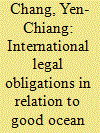| Srl | Item |
| 1 |
ID:
132325


|
|
|
|
|
| Publication |
2014.
|
| Summary/Abstract |
This article examines compliance with international laws prohibiting the intentional targeting of noncombatants in interstate war, specifically focusing on the role of third-party states in enforcement. We argue that the expectation of third-party coercion, when sufficiently high, can induce war participants to comply with this body of law. We identify the conditions under which combatant states will anticipate a high likelihood of coercion, demonstrating that third-party states are most likely to coerce combatants when they have both the willingness and opportunity to do so. Democratic third parties that value the rule of law and human rights possess the willingness to coerce war participants, while strong allies, trade partners, and intergovernmental organization (IGO) partners with existing ties to the combatant state have the opportunity to engage in coercion by linking combat-ant behavior to the provision of benefits or imposition of costs. Based on this logic, we hypothesize that war combatants who have ratified the Geneva/Hague Conventions prohibiting the intentional targeting of noncombatants during war are more likely to comply with the legal obligations included in those conventions when they interact with relatively strong democratic alliance, trade, and IGO partners. In a series of quantitative tests on a data set of all interstate wars from 1900 to 2003, we find strong statistical and substantive support for the role of third parties in inducing compliance with the law.
|
|
|
|
|
|
|
|
|
|
|
|
|
|
|
|
| 2 |
ID:
098767


|
|
|
|
|
| Publication |
2010.
|
| Summary/Abstract |
At present, the concept of good ocean governance is articulated in the literature only. This paper adopted eight elements of good governance as an analytical framework, namely, the rule of law, participatory, transparency, consensus-based decision making, accountability, equity and inclusiveness, responsiveness and coherence. These elements are partially supported by international treaty practice but have not yet received universal acceptance.
|
|
|
|
|
|
|
|
|
|
|
|
|
|
|
|